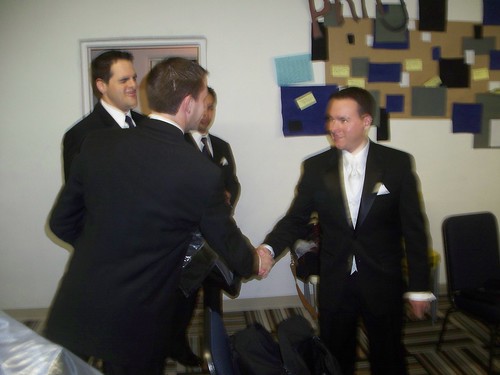How to make a bad impression
In the past few weeks, I have been flat-out amazed at how some people act in business/networking situations. They’ve not made a good impression.
Here’s how you too can make a bad impression:
1. Have a limp handshake (bonus points if clammy and sweaty too). The other day I met the director of a local chamber of commerce. She introduced herself and gave me the limpest handshake I can remember. I wanted to say to her that she needed to work on a firm handshake, instead, I shuddered inwardly. Limp handshakes communicate lack of conviction and being tentative. And also, yuck.
2. Don’t introduce yourself. I was at a small lunch gathering and a guy joined us late. He sat down and didn’t bother to say his name or what his business was. I didn’t find out until the end when he gave me his business card. Very few people require no introduction and generally, they don’t go to small business gatherings. To me, not introducing yourself shows you are not aware of other people.
3. Be late. At the same lunch gathering mentioned above, where I was a first-timer, the organizer showed up more than 15 minutes late. Being late for a meeting you organized is inexcusable. Being late in general just shows a disregard for others.
4. Don’t respond. Say we met at an event, and we exchange business cards, and we talk about having coffee soon, and then I send you an email (and then another) and I don’t hear back from you. Yeah. I get it. You don’t want to have coffee. That’s OK, but if in the future you change your mind, you’ve left me with a really bad impression. (This one also applies to social media. Check your @ replies on Twitter. Is someone asking you a question? Perhaps you should answer it).
5. Attack the other person. The other day I met a business owner who is a big fan of the chamber of commerce. I am not since I don’t usually find my target audience there. When she asked me if I was a member of her chamber, I explained why I am not. She got defensive and immediately began attacking me. She wasn’t polite or constructive. She was just mean and putting me down.
Here’s a few more:
- Be disinterested in other people or the topic being discussed.
- Dress inappropriately.
- Be dismissive.
- Don’t pay attention and then ask a question that has already been answered.
- Be negative.
- Interrupt. Repeatedly.
- Tell inappropriate (racist, sexist, etc.) jokes or stories. (Oh, it happens. All the time.)
Some people will only try to make a good impression with people they are trying to impress and ignore everyone else. That’s a guaranteed way to make a really bad impression (most everyone despises a brown-noser).
If you don’t care about how you come across, then you should also not be surprised if you are not doing well in your business. Impressions matter. You only have one chance to make a good first impression, but you have multiple chances to make a bad impression.
Have you dealt with these behaviors? What would you add?
About Deborah Brody
Deborah Brody writes and edits anything related to marketing communications. Most blog posts are written under the influence of caffeine.




